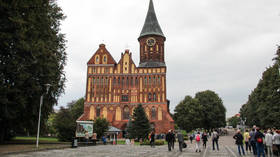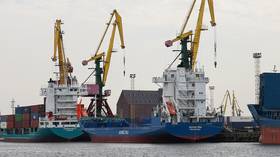Russian exclave head hails blockade victory

New EU guidance has removed the majority of restrictions on the transit of Russian goods to the country’s exclave of Kaliningrad, Governor Anton Alikhanov said on Thursday. Adding that Russia will continue to seek the removal of the road transit ban.
On Wednesday, the EU Commission issued “additional guidance” after Lithuania, citing EU sanctions against Moscow, banned shipments via its territory. Russia called the measures unprecedented and illegal, as they affect access to its own territory. The EU Commission’s latest guidance allows Russia to resume rail transit under certain conditions.
In an interview with Rossiya 1 TV Channel, Alikhanov described the EU’s move as a victory for Russian diplomacy, explaining that it lifted “more than 80% of the restrictions imposed on Kaliningrad transit.”
The first deliveries of goods, he added, will begin “today or tomorrow.” He emphasized that resumption of rail transit is especially important for the transportation of building materials and metals.
However, the governor said, “a significant part of the goods” remain under restrictions as the road transit of sanctioned goods is still not allowed. Alikhanov estimates that the ban affects 500-700 thousand tons of cargo per year out of 2.7-3 million tons of all sanctioned goods, which are subject to transit.
Russia will continue “to press further and solve this problem completely,” Alikhanov stressed.
He also noted that Russia reserves the right to provide a tough response if the restrictions on road transit are not lifted.
"The proposals that we made, of course, remain on the table, they are of varying degrees of destructiveness, economic effect,” he said.
Meanwhile, Lithuanian Prime Minister Ingrida Simonyte, speaking to the press on Thursday, confirmed that her country intends to follow EU guidance. She cited three reasons: respect for the EU Commission as an institution, the fact that the rules apply not only to Lithuania but to the “entire EU” and, most importantly, “respect for transatlantic unity.”
The prime minister also made it clear that until Lithuanian authorities establish new rules based on the EU clarifications, the current procedure for transit to Kaliningrad will stay in force. Simonyte also emphasized that the guidelines “very clearly state” that there is no return to the situation that existed in mid-June, “when all goods could be transported in transit through the territory of the EU to and from Kaliningrad.”
On Tuesday, Lithuania’s Customs Department reported it had stopped 34 trucks trying to cross its border from Kaliningrad and Belarus because they were transporting “sanctioned goods.” The trucks were forced to return to the territories of Russia and Belarus, it added. The vehicles were transporting car parts, furniture, glass, and alcohol, it revealed.













